SEKE 2018 at Redwood City, San Francisco Bay, California, USA
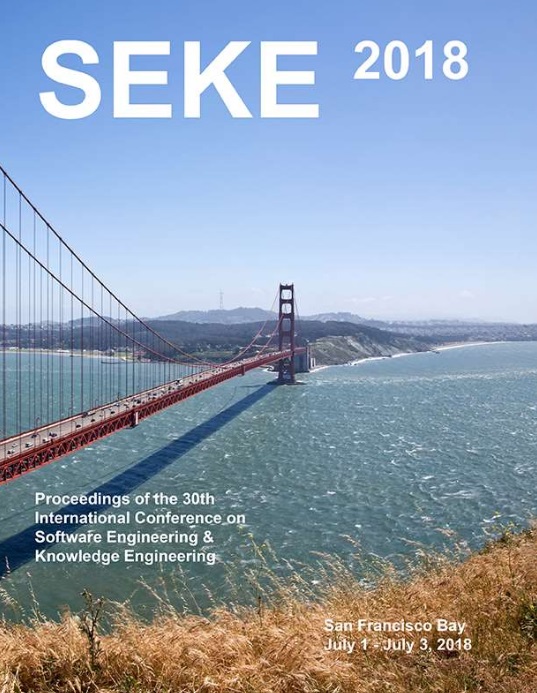
The 30th International Conference on Software Engineering and Knowledge Engineering (SEKE 2018) was held at Redwood City, San Francisco Bay, California, USA from July 1 to July 3, 2018.
Three papers from our group were accepted by the conference:
"Modeling and Verification of IEEE 802.11i Security Protocol for Internet of Things" by Yuteng Lu and Meng Sun
"Reo2PVS: Formal Specification and Verification of Component Coneectors" by M.Saqib Nawaz and Meng Sun
"Towards Formal Modeling and Verification of Probabilistic Connectors in Coq" by Xiyue Zhang and Meng Sun
Details of the conference can be found here.
"It's All About Coordination" at Amsterdam, the Netherlands

On May 25 2018, CWI organizes a symposium celebrating the lifelong scientific achievements of Prof. Farhad Arbab on the occasion of his retirement from CWI, "It's All About Coordination". Meng Sun gave an invited speech "Tons of Fun in a Zodiac Cycle" at the event.
A book collecting a number of papers by several of Farhad's close collaborators has been published by Springer, which can be found here.
SBMF 2017 at Recife-Pe, Brazil
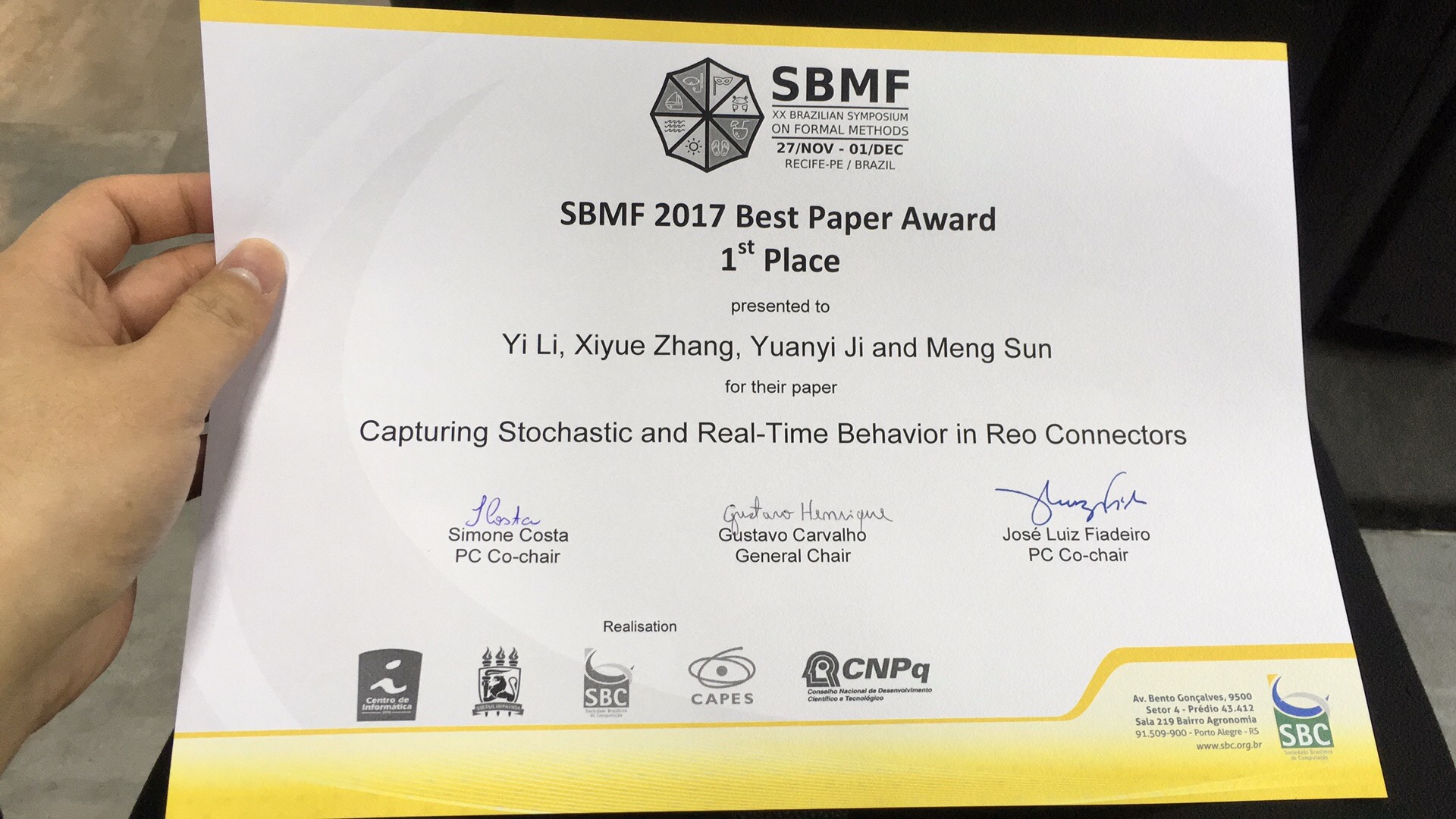
The 20th Brazilian Symposium on Formal Methods (SBMF 2017) was held in Recife-Pe, Brazil on November 29-December 1, 2017.
The work "Capturing Stochastic and Real-Time Behavior in Reo Connectors" by Yi Li, Xiyue Zhang, Yuanyi Ji and Meng Sun got the Best Paper Award (1st Place) at the symposium.
LEDS 2017 at Haikou, China
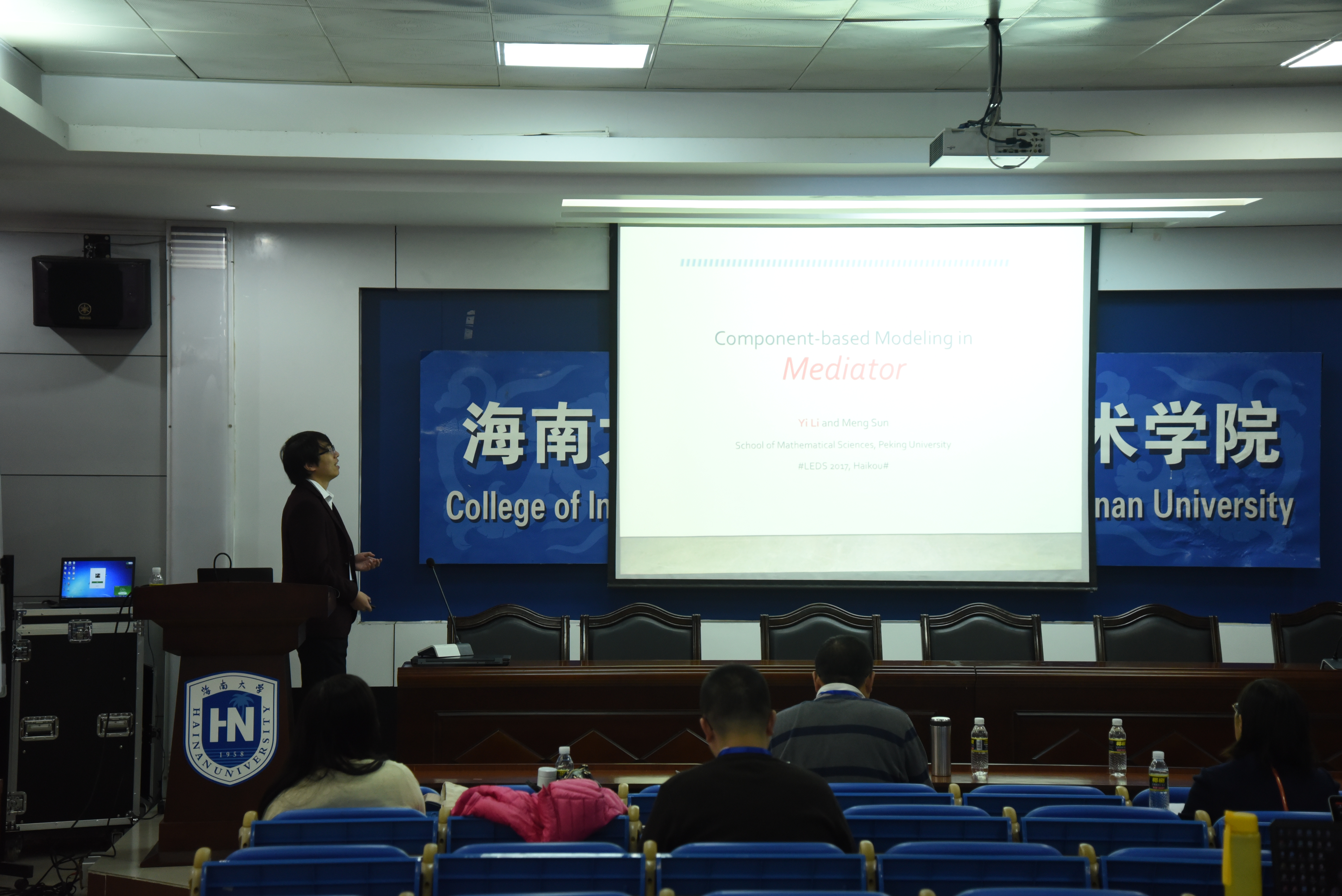
The Colloquium on Logic in Engineering Dependable Software (LEDS 2017) was held in Haikou, China on November 25-26, 2017.
Yi Li gave a talk on component based modeling in Mediator at the colloquium.
MAVeLoS 2017 at Beijing, China
The PKU International Workshop on Modeling, Analysis and Verification of Large-Scale Complex Systems was held in Beijing, China on October 7-8, 2017.
Details of the workshop can be found here.
FOCLASA 2017 at Trento, Italy

The 15th International Workshop on Foundations of Coordination Languages and Self-Adaptative Systems was held in Trento, Italy, in September, 2017.
The details about the conference can be found here.
CAP Workshop at Heidelberg, Germany
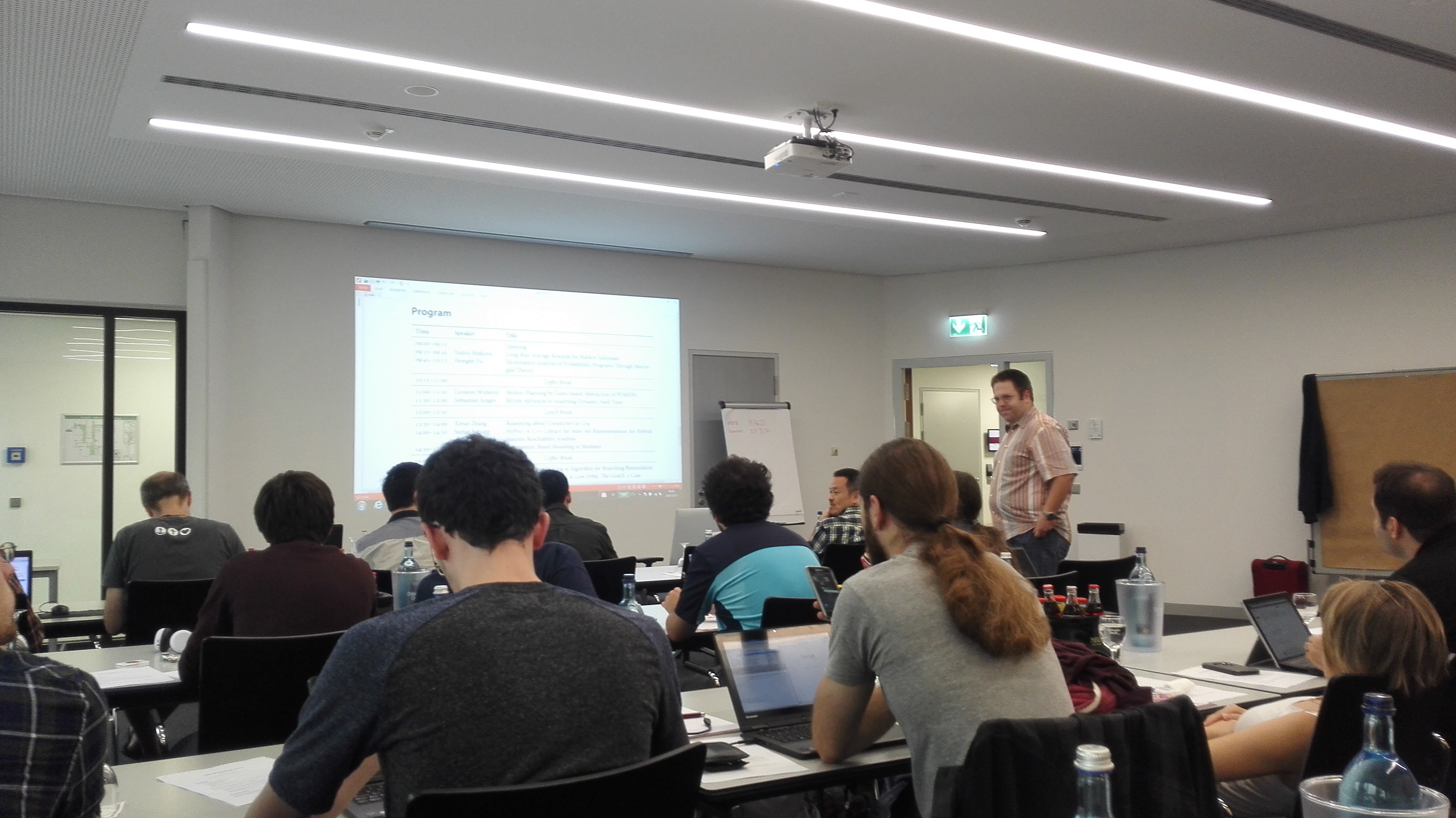
The China-Germany bilateral project CAP workshop was held in Heidelberg, Germany, in July, 2017. The PhD students Yi Li and Xiyue Zhang gave two presentations at the workshop.
SEKE 2017 at Pittsburgh, USA

The 29th International Conference on Software Engineering & Knowledge Engineering was held in Pittsburgh, USA, in July, 2017.
The details about the conference can be found here.
FM 2016 at Cyprus

The 21st International Symposium on Formal Methods was held in Cyprus in November, 2016.
The details about the conference can be found here.
FACS 2016 at Besançon, France
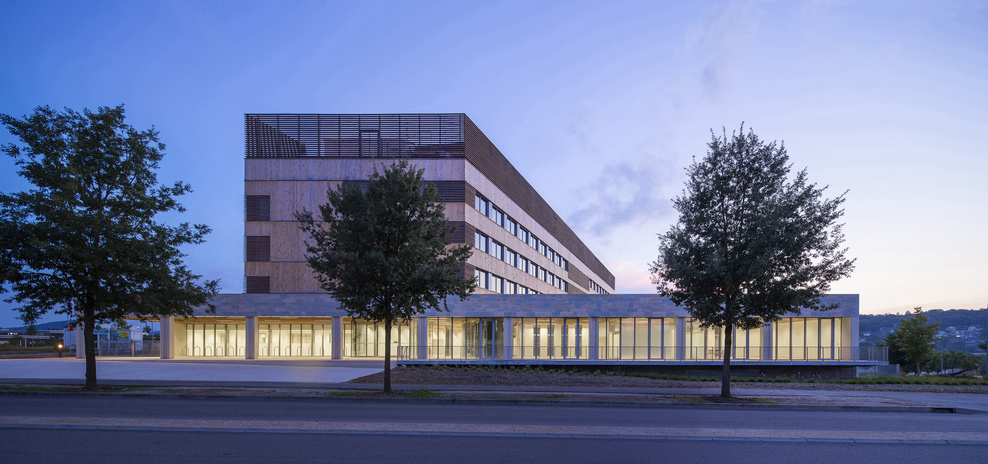
The 13th International Conference on Formal Aspects of Component Software was held in Besançon, France in October, 2016.
The component-based software development approach has emerged as a promising paradigm to cope with the complexity of present-day software systems by bringing sound engineering principles into software engineering. However, many challenging conceptual and technological issues still remain in component-/service-based software development theory and practice. Moreover, the advent of cloud computing, cyber-physical systems, and of the Internet of things has brought to the fore new dimensions, such as quality of service, reconfiguration and robustness to withstand inevitable faults, which require established concepts to be revisited and new ones to be developed in order to meet the opportunities offered by those architectures.
FACS 2016 is concerned with how formal methods can be used to make component-based and service-oriented software development succeed. Formal methods have provided a foundation for component-based software by successfully addressing challenging issues such as mathematical models for components, composition and adaptation, or rigorous approaches to verification, deployment, testing, and certification.
The details about the conference can be found here.
TASE 2016 at Shanghai, China
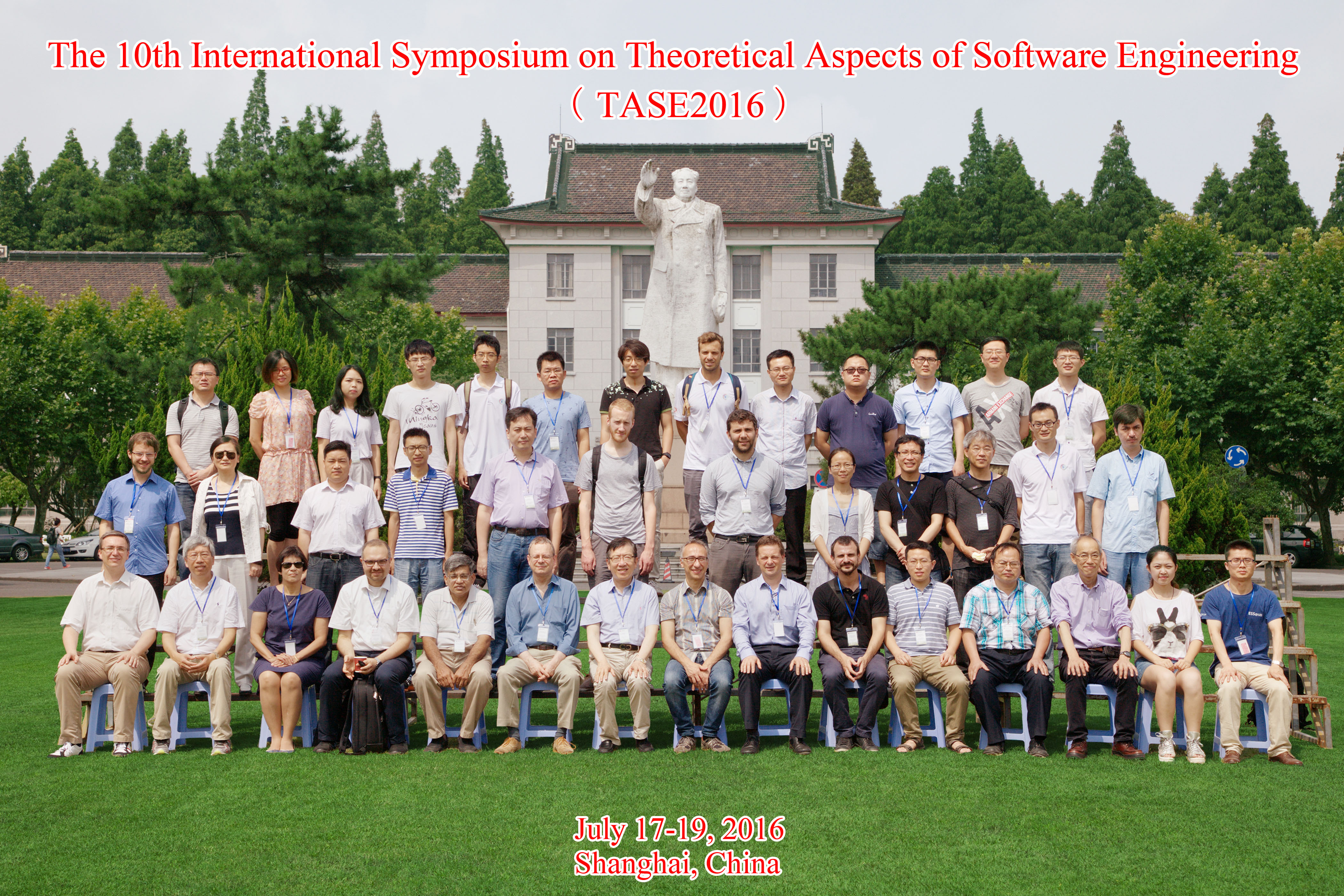
The 10th International Symposium on Theoretical Aspects of Software Engineering was held in Shanghai, China in July, 2016.
Modern society is increasingly dependent on software systems that are becoming larger and more complex. This poses new challenges to the various aspects of software engineering, for instance, software dependability in trusted computing, interaction with physical components in cyber physical systems, distribution in cloud computing applications, etc. Hence, new concepts and methodologies are required to enhance the development of software engineering from theoretical aspects. TASE 2015 aims to provide a forum for people from academia and industry to communicate their latest results on theoretical advances in software engineering.
The details about the conference can be found here.
TASE 2015 at Nanjing, China

The 9th International Symposium on Theoretical Aspects of Software Engineering will be held in Nanjing, China in September, 2015.
Modern society is increasingly dependent on software systems that are becoming larger and more complex. This poses new challenges to the various aspects of software engineering, for instance, software dependability in trusted computing, interaction with physical components in cyber physical systems, distribution in cloud computing applications, etc. Hence, new concepts and methodologies are required to enhance the development of software engineering from theoretical aspects. TASE 2015 aims to provide a forum for people from academia and industry to communicate their latest results on theoretical advances in software engineering.
The details about the conference can be found here.
LEDS 2015 at Xi'an

The 5th Colloquium on Logic in Engineering Dependable Software,LEDS2015 was held in Xi'an, China in September, 2015. This year the colloquium was chaired by Prof. Zhenhua Duan and Prof. Yunwei Dong.
Details about the conference can be found here.
LEDS 2014 at Guilin, China

LEDS 2014 is held at Guilin University of Electronic Technology, Guilin, China, Nov. 13-15, 2014. The symposium brings together researchers and engineers from both academia and industry in China to present and discuss their work in dependable software engineering. The detailed programme can be found here.
FSEN 2015 at Tehran, Iran

FSEN is an international conference that aims to bring together researchers, engineers, developers, and practitioners from the academia and the industry to present and discuss their research work in the area of formal methods for software engineering. This conference seeks to facilitate the transfer of experience, adaptation of methods, and where possible, foster collaboration among different groups. The topics of interest cover all aspects of formal methods, especially those related to advancing the application of formal methods in the software industry and promoting their integration with practical engineering techniques. Following the success of the previous FSEN editions, the next edition of the FSEN conference will take place in Tehran, Iran, April 22-24, 2015.
The dates for abstract and paper submissions are Oct. 24 and 31, 2014.
FOCLASA 2015 at Madrid, Spain

The 14th International Workshop on Foundations of Coordination Languages and Self-Adaptive Systems will be held at Madrid, Spain, September 5, 2015.
Modern software systems are distributed, concurrent, mobile, and often involve composition of heterogeneous components and stand-alone services. Service coordination and self-adaptation constitute the core characteristics of distributed and service-oriented systems. Coordination languages and formal approaches to modelling and reasoning about self-adaptive behaviour help to simplify the development of complex distributed service-based systems, enable functional correctness proofs and improve reusability and maintainability of such systems.
This year the workshop will be collocated with the 26th International Conference on Concurrency Theory, CONCUR 2015.
FACS 2014 at Bertinoro, Italy

The 11th International Symposium on Formal Aspects of Component Software will be held at Bertinoro, Italy, September 10-12, 2014.
This year the symposium will be co-located with the 11th International Conference on Integrated Formal Methods, iFM 2014.
ICFEM 2014 at Luxembourg

Since 1997, ICFEM has provided a forum for those interested in the application of formal engineering methods to computer systems. Researchers and practitioners, from industry, academia, and government, are encouraged to attend, and to help advance the state of the art. We are interested in work that has been incorporated into real production systems, and in theoretical work that promises to bring practical, tangible benefit.
The goal of this conference is to bring together industrial, academic, and government experts, from a variety of user domains and software disciplines, to help advance the state of the art. Researchers, practitioners, tool developers and users, and technology transition experts are all welcome. We are interested in work that has been incorporated into real production systems, and in theoretical work that promises to bring practical, tangible as well as engineering benefit.
The conference will be held in Luxembourg, November 3-7, 2014.
IHMSC 2014 at Hangzhou, China

The 6th International Conference on Intelligent Human-Machine Systems and Cybernetics (IHMSC 2014) will take place at Zhejiang University in Hangzhou, China, August 26-27, 2014. The aim of this conference is to provide a forum for exchanges of research results, ideas for and experience of application among researchers and practitioners involved with all aspects of Human-Machine Systems and Cybernetics.
FACS 2013 at Nanchang, China
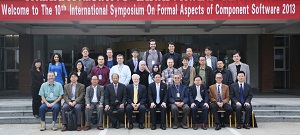
Component-based software development is a paradigm that has been proposing sound engineering principles and techniques for coping with the complexity of software-intensive systems. However, many challenging conceptual and technological issues remain that require further research.
Moreover, the advent of service-oriented and cloud computing has brought to the fore new dimensions, such as quality of service and robustness to withstand inevitable faults, which require established concepts to be revisited and new ones to be developed in order to meet the opportunities offered by those architectures. As software applications become themselves components of wider socio-technical systems, further challenges arise from the need to create and manage interactions, which can evolve in time and space, and rely on the use of resources that can change in non-computable ways.
FACS 2013 is concerned with how formal methods can be used to make component-based development fit for the new architectures of today and the systems that are now pervading the socio-economic world. Formal methods have provided foundations for component-based software through research on mathematical models for components, composition and adaptation, and rigorous approaches to verification, deployment, testing, and certification. Whilst those avenues still need to be further explored, time is also ripe to bring new techniques to the fore, such as those based on stochastic models and simulation.